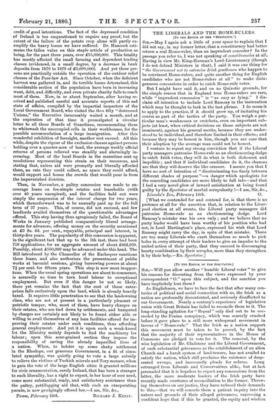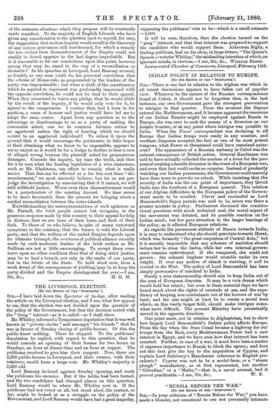(TO THE EDITOR OF THE BPS C ATOR.)
you allow another "humble Liberal voter" to give his reasons for dissenting from the views expressed by your correspondent "0." upon this subject, and the sanction you have implicitely lent them?
As Englishmen, we have to face the fact that after many cen- turies of political and social connection with us, the Irish as a, nation are profoundly discontented, and seriously disaffected to our Government. Nearly a century's experience of legislative union with Great Britain has failed to reconcile them to it. The long-standing agitation for "Repeal" only died out to be suc- ceeded by the Fenian conspiracy, which was scarcely crashed before it gave place to a still more widespread movement in favour of "Home-rule." That the Irish as a nation support this movement must be taken to be proved, by the fact that the majority of their representatives in the House of Commons are pledged to vote for it. The removal, by the wise legislation of Mr. Gladstone and the Liberal Government, of such substantial grievances as the establishment of an alien Church and a harsh system of land-tenure, has not availed to satisfy the nation, which still proclaims the existence of deep- seated wrongs, and incessantly pleads for redress. Long estranged from Liberals and Conservatives alike, but at last persuaded that it is hopeless to expect any concessions from the latter, the more moderate leaders of the Irish party have recently made overtures of reconciliation to the former. Throw- ing themselves on our justice, they have reduced their demands to this,—that we will concede them a patient inquiry into the nature and grounds of their alleged grievances, expressing a confident hope that if this be granted, the equity and wisdom of the measure of redress which they propose will be eventually made manifest. To the majority of English Liberals who have given any consideration to the question (and to myself, for one), the supposition that such an inquiry would result in the discovery of any serious grievances still nnredressed, for which a remedy far less violent than dismemberment of the Empire could not readily be found, appears to the last degree improbable. But is it reasonable to let our convictions upon this point, however strong they may be, stand in the way of a reconciliation so desirable ? In his speeches at Liverpool, Lord Ramsay avowed, as frankly as any man could do, his personal conviction that the scheme of Home-rule, as propounded by the leaders of the party, was impracticable ; but when a sixth of the constituency which he aspired to represent was profoundly impressed with the opposite conviction, he could not be deaf to their appeal. When they consented to waive any pledge that he would abide by the result of the inquiry, if he would only vote for it, he agreed to the compromise. I confess that, had I been in his position, a sense of honour and justice would have led me to adopt the same course. Apart from any question as to the advantage or disadvantage to us as a party of making the concession asked, can we in common fairness refuse to an aggrieved nation the right of hearing which we should accord to an aggrieved individual ? To refuse it upon the ground that it would encourage the petitioners in false hopes of their obtaining what we know to be impossible, appears to me as unjust as it would be for a Judge to decline to hear a case of alleged wrong because the plaintiff asked for preposterous damages. Concede the inquiry, lay bare the truth, and then let it be seen what the healing legislation of a wise statesman, such as Mr. Gladstone, can effect to remedy what is really amiss. That this can be effected at a far less cost than " die- memberment," we most sincerely believe; but let us not pre- judge the investigation by announcing that if it cannot, we will still withhold justice. Worse even than dismemberment would be a perpetuation of the existing discord. No time seems to be more favourable than the present for bringing about a cordial reconciliation between the sister-islands.
Notwithstanding the misrepresentations of such agitators as Mr. Parnell, the Irish people cannot but recognise, in the generous response made by this country to their appeal for help in distress, that we are bone of their bone, and flesh of their flesh. To those of us who believe, in spite of many untoward symptoms to the contrary, that the future is with the Liberal party, and that the welfare of the united Empire depends upon its ultimate triumph, the overtures of political alliance recently made by such moderate leaders of the Irish section as Mr. Sullivan are not a little encouraging. To accept those over- tures upon no other condition than that of doing strict justice, may be to heal a breach, not only in the ranks of our party, but in the fabric of the State. To hold aloof now, from a weak dread of the consequences of yielding,"may be to keep the party divided and the Empire disintegrated for ever.—I am,



































 Previous page
Previous page